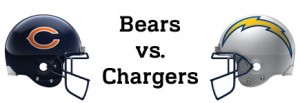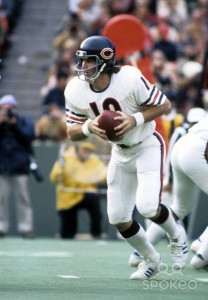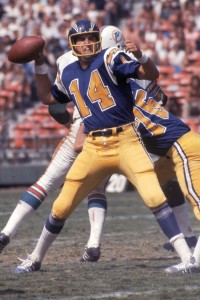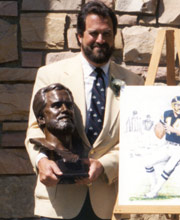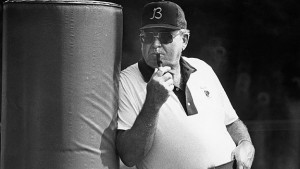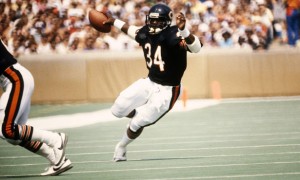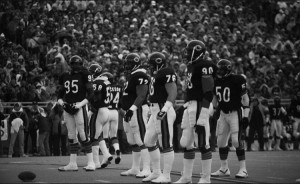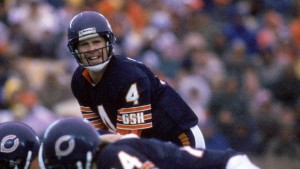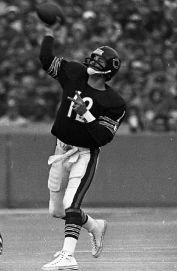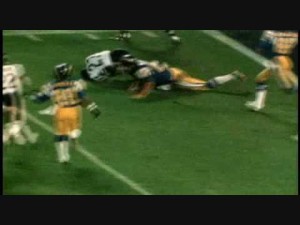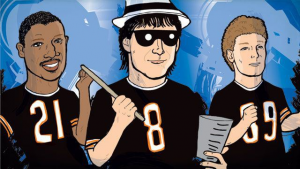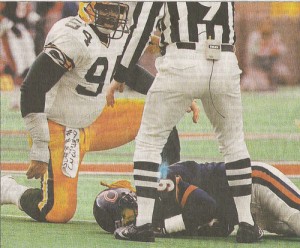By Jeremy Harris
Monday might, the Chicago Bears and San Diego Chargers will meet for the 12th time during the regular season. To try to ratchet up the excitement for a game between teams with a combined record of 4-11, we will highlight six memorable clashes, starting with three today, between the two clubs and also discuss some quixotic coincidences that link the two franchises.
1). Bears at Chargers; December 4, 1978 (“Dan Fouts should have been a Bear”):
Both teams entered the 1973 draft seeking an upgrade at quarterback. The 1972 Bears finished with the league’s fewest passing yards , the lowest completion percentage and the second worst quarterback rating. The Chargers John Hadl’s brilliant 10-year run as the team’s signal caller came to end when he was traded to the Los Angeles Rams.
With the 33rd pick in the 2nd round, the Bears selected Florida State QB Gary Huff. 31 picks later, the Chargers snatched up Oregon QB Dan Fouts.
While the 6-7 Chargers were surging before hosting Chicago in 1978, the revolutionary Air Coryell passing scheme had yet to take flight. That would change.
San Diego piled up 481 yards of offense to Chicago’s 112 , Fouts completed 16 of 24 attempts for 249 yards, including 155 on seven receptions to rookie WR John Jefferson, and the Chargers handed the Bears one of their most humiliating defeats in franchise history, 40-7, en route to their first winning season (9-7) since the 1970 NFL-AFL merger.
One of the few positives for Chicago was legendary LB Doug Buffone’s interception. Buffone had been drafted in 1966 by both the Bears of the NFL and Chargers of the AFL. The Pennsylvania native chose to sign with the Bears instead of taking his bruising hits to the West Coast.
Fouts would play his entire fifteen-year career for San Diego, retiring with the second most career passing yards in league history to Fran Tarkenton. Conversely, in his four-year stint with the Bears, Huff threw almost three times as many interceptions (34) as touchdowns (12) and finished with just 3271 passing yards, a total Fouts eclipsed in five separate seasons. Bears’ fans have been yearning for a quarterback of Fouts’ caliber since the inception of the franchise. The Hall-of-Famer was there for the picking.
2). Chargers at Bears; October 25, 1981 (“A baby step to a championship”):
Fouts and the Chargers (5-2), now in the midst of five consecutive winning seasons (1978-1982), marched into Soldier Field as blowout favorites against the 1-6 Bears. Nevertheless, bombastic Bears’ defensive coordinator Buddy Ryan was undeterred and chose the vaunted Chargers’ offense to test out his brainchild, the 46 defense.
Fouts suffered the worst game of his career, harried and confused into completing just 13 of 43 passes and throwing two interceptions. The Bears, led by Walter Payton’s 107, rushed for almost 200 yards, and placekicker John Roveto made amends for two missed field goals by banging through a 26-yarder in overtime to complete the 20-17 upset.
The victory should best be remembered as the first glimmer of a defensive scheme that, once the personnel was in place, would terrorize the league during the 1984 and 1985 seasons and help lead the Bears to a Super Bowl title.
Bears’ rookie and future Hall-of-Famer Mike Singletary made his first career start, but when he called a timeout on the Chargers’ second play from scrimmage, an incensed Buddy Ryan banished Singletary to the bench for the rest of the game.
Finally, Bears’ rookie CB Reuben Henderson tallied one of the team’s two interceptions. The Bears traded Henderson to the Chargers following the 1982 season for two picks in the 1983 draft, one of which the Bears used on Iowa OL Mark Bortz. The rugged two-time Pro Bowler played his entire career for Chicago (1983-1994) and was a critical piece on the 1985 championship team.
3). Bears at Chargers, December 3, 1984 (“foreshadowing the fatal flaw”):
The Bears entered this Monday Night Football tilt with a 9-4 record, and the Chargers, experiencing the beginning of a prolonged decline, sported a 6-7 mark.
The Bears’ quarterback situation was in disarray, however. The team had already jettisoned Bob Avellini, in his second stint with the organization, after he performed poorly in a 38-9 drubbing at Seattle in Week 4 in place of injured starter Jim McMahon. McMahon returned the following week, but his season was ended in a Week 10 win against the Los Angeles Raiders. Former Kansas City Chief Steve Fuller then took over the reins, and he started the Week 14 game against San Diego.
However, Fuller was sidelined with an injury in the first half, forcing the Bears to turn to their fourth quarterback of the season, Rusty Lisch, best known for serving as Joe Montana’s backup at Notre Dame. The Bears led 7-6 in the fourth quarter when Chargers backup QB Ed Luther connected with WR Bobby Duckworth on an 88-yard touchdown.
Trailing 13-7 late in the fourth quarter, Lisch, who passed for only 159 yards on 33 attempts, was intercepted by Chargers’ lineman Lee Williams, who rumbled 66 yards for the game clinching touchdown in a 20-7 Bears’ loss.
Before scoring the game-winning touchdown, Duckworth committed a gaffe that has been replayed hundreds of times on NFL bloopers reels. In the third quarter, Duckworth caught a pass and had nothing but Jack Murphy Stadium grass between him and the end zone. Just inside the ten-yard-line, the ball inexplicably popped loose, and the trailing Mike Richardson recovered the unforced fumble for the Bears.
Duckworth was traded to the Los Angeles Rams before the 1985 season, and when the Rams met the Bears in the NFC Championship game, Duckworth would not find any open running space. He was held to one catch for eight yards in the Rams 24-0 loss that sent the Bears to Super Bowl XX.
Punter Maury Buford, who would spend five of his last six seasons with the Bears and even had a non-singing role in the Bears Super Bowl Shuffle video, punted for the Chargers in the Bears Monday night loss.
Lisch performed so poorly the next week against Green Bay that Coach Mike Ditka replaced him with RB Walter Payton. The following week, a fifth Bears quarterback started a game, 38-year-old Greg Landry, who had not attempted a pass since the 1981 season.
When Bears fans ask rhetorically how a team chocked so full of Pro Bowl talent and which made the playoffs seven times between 1984 and 1991 could only manage one Super Bowl title, they should revisit the team’s loss to the Chargers for perspective. Chicago’s starting quarterback either played injured or was sidelined for five of their seven postseason appearances, instability that likely led to missing championship rings.
Check back Saturday for more Bears and Chargers memories.
